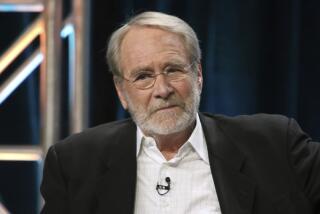Bernard Malamud, Pulitzer Prize Author, Dies
- Share via
Pulitzer Prize-winning author Bernard Malamud, whose fictions blended the natural and supernatural with sometimes startling results, died Tuesday at his apartment in New York City.
He was 71, and sources in New York said his death was from natural causes but declined to give details. Timothy Seldes, president of the literary agency that handled Malamud’s works, said the author’s family would make a statement today.
He is survived by his wife, Ann de Chiara; a son, Paul, and a daughter, Janna.
Malamud’s first book, “The Natural,” a realistic fantasy about baseball published in 1952, was made into a motion picture starring Robert Redford three decades later--but he was best known for two later works.
“The Magic Barrel,” a collection of short stories, won Malamud his first major prize--the National Book Award--in 1959.
And “The Fixer,” a novel dealing with anti-Semitism in Czarist Russia just after the turn of the century, won the Pulitzer Prize and National Book Award for 1967.
Malamud once described himself as a “chronicler of simple people struggling to make their lives work,” but in truth there was little that was simple or uncomplicated about the construction and execution of his tales.
“He is a storyteller so expert in his craft that he makes it look easy,” a latter-day reviewer said. “Malamud can lead you through the most incredible story line and cause you to suspend disbelief long enough to finish.”
Born April 26, 1914, in Brooklyn, Malamud was the elder son of a grocer who had emigrated from Russia, and grew up in a home where emphasis was on the cultural rather than the religious significance of his Jewish heritage.
“We were more interested in Yiddish theater than in shul,” he told a 1950s interviewer. “My mother’s family were performers and my father was a world-class teller of tales from the Old Country. I won’t say it dominated the rest of my life--but it colored it, believe me!”
Those tales of his father’s became the basis for many stories he made up for the entertainment of friends during his boyhood--and became what he called “the bedrock” of his subsequent literary career.
His short stories often drew from Yiddish oral tradition, and his novels combined realism and symbolism in ways that evoke the Russian novels of the 19th Century.
Still, it was not until the Holocaust of World War II that he thought he had something to say as a writer.
“I, for one, believe that not enough has been made of the tragedy of the destruction of 6 million Jews,” he wrote. “Somebody has to cry--even if it’s a writer, 20 years later.”
Malamud’s second novel was “The Assistant,” which established him in the late 1950s as a major author, often included with Saul Bellow and Philip Roth in a triumvirate that defined the era.
“The Tenants,” written in 1971, was an examination in microcosm of the relationship between blacks and whites in urban America. It was followed in 1979 by “Dubin’s Lives,” and in 1982 by “God’s Grace,” about the sole human survivor of a nuclear holocaust, which Malamud called “a visionary tale” echoing his earlier axiom that the purpose of a writer is “to keep civilization from destroying itself.”
His other books included “The Assistant,” “A New Life,” “Idiots First,” “Pictures of Fidelman” and “Rembrandt’s Hat.”
Educated at City College of New York and Columbia University, Malamud was a former president of PEN American Center, the U.S. branch of an international organization of poets, playwrights and authors.
He had been a member of the faculty of Bennington College for more than two decades, but a spokesman for the school said he had not been regularly involved with teaching there in recent years, although he had remained “a presence on campus” and a participant in summer writers’ workshops.
“The main thing,” he told an interviewer in 1977, “is to think and feel and relate to the world around you--to help others see anything you think is important. If you can do this and you sell only one copy of what you write, you’re a success. If you can’t, a million-seller with residuals is worth . . . what?”
More to Read
Sign up for our Book Club newsletter
Get the latest news, events and more from the Los Angeles Times Book Club, and help us get L.A. reading and talking.
You may occasionally receive promotional content from the Los Angeles Times.










